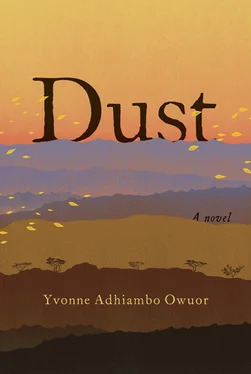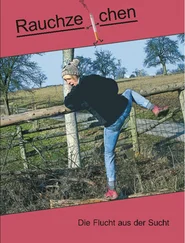Eeee … lek wuonda . Deceived by dreams.
Nyipir pounds metal to dust, listening helplessly.
Thwack! This is how to beat back seething phantoms.
Thwack! Bury engulfing blackness and its music.
Thwack! How to demand silence.
Aieee!
The usual breeze east of Badda Huri hums over the lava-sprinkled drylands of the Dida Galgalu Desert. Green and beige doum palms at the water point a kilometer away lean west, toward derelict Dida Gola.
Dust in his eyes, inward gaze. Inside Nyipir, secrets stir, and his mouth opens. “Ona icembe riugi ni rituhaga,” he croaks. Witness from fifty-year-old burial grounds. “Ona icembe riugi ni rituhaga.” Nyipir scrambles for silence. Ona icembe riugi ni rituhaga —repetitive, loud-speaking thoughts.
Ajany hears Nyipir. Listens for more. Galgalu hears Nyipir. Knows he is crying. He wanders away, making lines on the earth with his herding stick.
Stillness. Then Nyipir speaks. “A man I knew used to say Ona icembe riugi ni rituhaga before we dug the graves.”
Ajany hears “ dug the graves .”
Nyipir spits.
He hacks at the ground. Nothing more to add. Glut of shadows. Shadows of phantoms.
What endures?
A disappearing mother, heaving silences, and the desire to vomit out anguish. Head throbs, fists clench and unclench. Ajany teeters on the edges of inside fog. Liquid slides down her lips. Nosebleed, small tears.
She flees.
Dashes into the dimly lit interior of their splintering pink house that at night becomes a sparkle-crackle of parts being chomped down by unseen termites.

Wuoth Ogik was once a sanctuary crammed with the music of rangeland life: a father’s hollow cough, herders’ sibilant whistles, day handing over life to the night, a mother’s sudden, haunted cry, a brother singing water songs to camels. What endures? A father sighing Aiee! Talkative shadows, crumbling walls, scent of dung and dream, reflections of long-ago clattering of polished Ajua stones falling into a brown wooden board of fourteen holes; the lives of cows, sheep, goats, and camels; three mangy beige-and-black descendants of a fierce mongrel herding dog with a touch of hyena.
What endures?
Elastic time.
Another junction. Brazil’s Atlantic Ocean, São Salvador da Bahia de Todos os Santos. Five days ago, Ajany had been there, staring at a collage of deep-blue skies, fluffy clouds, and a spread-out view of the beige and frothing ocean. Pre-Christmas exhilaration sprinkled with the beat of a mild pulse of terror attached to dread, of waiting and stillness. She had tried to phone Odidi. She had also been waiting for others, the law keepers, to come for her, had expected up to the end, before the plane strained for high skies, to be stopped and caught. She had expected all these others to reach her first, but instead Nyipir had phoned from Kenya.
“B-baba.” Afraid he knew what she had just done.
But he had whispered, “Odidi’s gone.”
At first she had deleted what she thought she had heard. Did not ask what gone meant. Listened when Baba had said, “Come home, nyara .” He added, “Come home. Please?” His voice had been low and aged.
She had left Bahia with an orange suitcase and red carry-on half full of mismatched clothes, assorted art supplies, two passports, and three credit cards. A red cell phone and the amethyst necklace she always wore. She had thrown her black MacBook with the tomes of commercial art, her living, into a red shoulder bag and fled.
Also.
In the loneliness of the eastern corner of her all-white, big-windowed room, a space set apart, perched on a black stand sits a half-shaped clay face resting on a plaster skull. White rubber stick tissue-depth markers cut to different lengths, glued in twelve points of the face; the other nine had been removed. The nose and mouth, shaped and reshaped and taken apart over seven years, were half done and gaped in anticipation of a conclusion. The piece’s eye orbits had worn and discarded all colors of mannequin eyes. Thin strips of clay connected the white pegs on the face and across the cranium. The lattice spaces had been filled and refilled with clay, everything reconstructed from the dark-lit memory of a skeleton and its last-breath gesture. The form had journeyed with her for seven years, traversed the Americas wrapped in brown paper, waiting for dimensions, nuances, completion, and a name. She had considered it. Stroked the plaster on the unfinished face, the undone muscles. Arabel Ajany had not looked at it when she left.
All departures are layered. Hers was accompanied by fingers of silence on the lips of at least ninety ghosts. Arrivals. Touchdown at Jomo Kenyatta International Airport against a dawn cliché of a postcard Nairobi sunrise, acacia-in-the-morning scene, the sky red, mauve. An exact sensation of life wafted around the passengers. Kaleidoscope flavors, earth scents, for her a tumble of memories. A mother’s hand sprinkling mixed herbs into water-keeping sheepskin vessels, spicing hair with ghee, cedar body-washes with desiccated acacia bark and leleshwa leaves. A childhood written in aromas.
At the customs unit, steps toward a queue designated for East African citizens, Ajany was of Kenya again. A dour-looking teak-toned officer with cheap green cuff links on his shirtsleeves stamped the inside page of her blue passport. Thump . “You missed the vote.” He was gruff. “Karibu nyumbani.”
Baggage hall, and a circuitous trolley roll. A glance at the waiting people. And then, in front of her, out of place because he was so detached, so elegant and tall, was Baba, who stood where the outside world separated itself from the inside mêlée. She remembers the warm light, the clouds that caught the edge of her left eye, the smell of rained-upon earth mingling with smoke and age and dust and sun and cows on her father’s coat. She remembers her head on his shoulder and tears that would not stop. She remembers Baba murmuring, “Ah, nyathina! Ah, nyathina! ” She remembers being safe, and the rhythm of his hands patting her back, a rumbling voice calling her his own.
Arms linked, they had traveled the road from airport to morgue in Leonard’s yellow taxi, in silence. Baba watched the road, the vein on the side of his head pulsing. Traffic nervy, bumper-to-bumper. Red brake lights spilled onto the wet road, like escaping blood. Whispery breeze. Above, low-hanging telephone wires swung to, fro, to, fro, tar-paint pole to tar-paint pole. Along the road, leftovers of last month’s jacaranda season, the green grass brown-tipped from too-short rains. Next to a lamppost, a purple-pink bougainvillea had wrapped itself around a twisted croton tree. Billboarded faces of presidential candidates and corporate marketers stained the land; messianic promises on smiley faces, salvation products in shiny packages.
Leonard had turned knobs to increase the radio volume.
They heard a menu of vote counts, rumors, accusations, tallying-hall disruptions, and even more fantastic numbers. The rest of the world did not exist. The car swung left, swooped right across an uneven road, and stopped at a gate of peeling yellow-green paint with a coat of arms. It read Nairobi City Mortuary .
What endures?
Surprise.
It is also a question mark.
Now, in the wide-spaced rooms of home, Ajany lunges from spot to spot, tugging at filaments she can feel, urging Odidi in. See .
The room she wanders through has wood shutters that do not close and is infused with the smell of dung, salt, milk, smoke, herbs, and ghee. Ajany stumbles over a fourteen-holed Ajua board on the floor, moves it aside with her feet. On the mantelpiece, two black-and-white photographs, one showing a man on horseback carrying a crooked Kenyan flag — her father, Nyipir Oganda — the other, in a Sellotaped frame, featuring a broad-faced man, the late minister for economic planning, planner of a pre-independence mass airlift, designer of the national flag, the murdered Mr. Tom Mboya. Near these, a fading color studio-portrait of a well-dressed Oganda family, including Galgalu, arranged as if facing a firing squad.
Читать дальше












